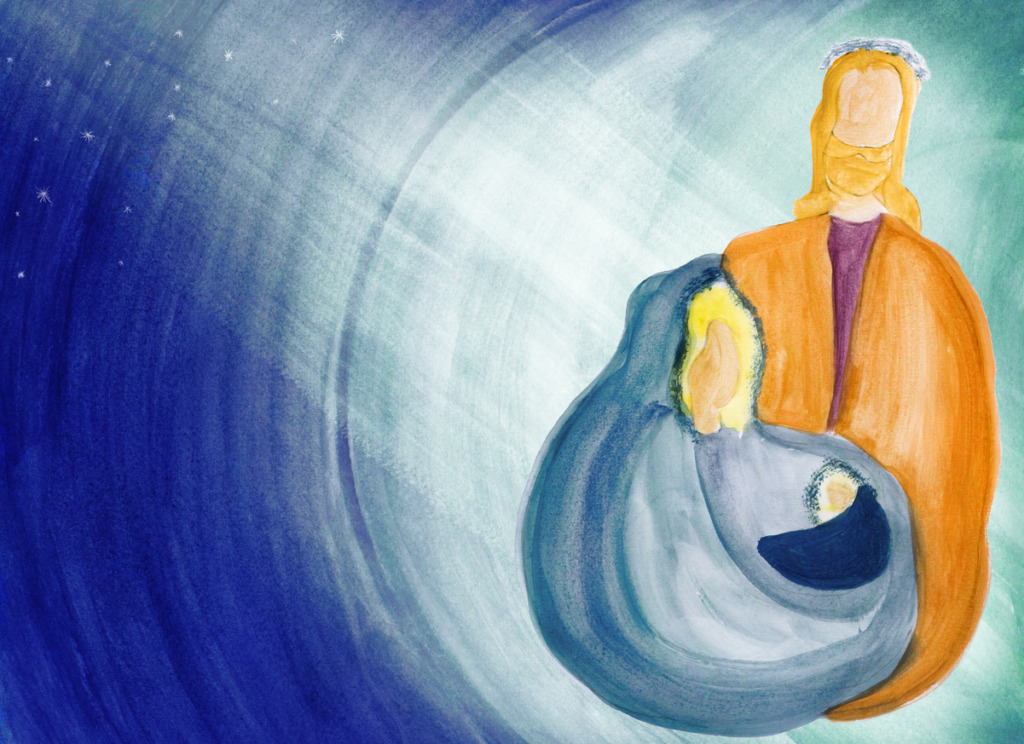Advent is bathed in mystery. There is, of course, the Mystery of the Incarnation, but there’s also the mystery of time. Advent is rooted in the longing of the Israelites, a longing that resonates with the deepest longing in the heart of every person. Like the Old Testament prophets who looked for the coming of the Messiah, we await the day when the veil of time will be pierced.
Liturgical readings alternate between the past and future because Advent is not about living in the past; it’s about celebrating Christ’s presence here and now in the Eucharist and in one another, even as we are reminded that Christ will come at the end of time.
The juxtaposition of time often reminds me of “A Christmas Carol” when old Ebenezer Scrooge is visited by the spirits of Christmas past, Christmas present and Christmas future. These nighttime visitations result in his turning his life around, causing him to cast the old self aside.
So it happens that in the final scenes, we see Scrooge dancing down the street, shouting “Merry Christmas” to everyone he meets, whereas in the past all he could say was “Humbug.” The story ends just as we hoped and leaves us feeling that all is right with the world.
It seems that when the mysteries of God become more than we can fathom, we naturally turn to story. We create a narrative that has a beginning, a climax and an end. But God is beyond the constraints of time, and so when God broke into human history, a new narrative was born, though certainly not the one that was expected.
The Jews were expecting a glorious king who would restore Israel to its former glory once and for all. But the reality could not have been more different. The Son of God came into the world, born from the stump of Jesse, but there were no royal trappings surrounding his birth. He came into the world largely unnoticed, in a borrowed cave that was used to shelter animals.
As the evangelist John wrote: “He came to his own, but his own did not accept Him” ( John 1:11). His rejection was but a foretaste of the destiny that would be his as Savior of the World.
Some people find it curious that Matthew begins the story of Jesus’ birth by recounting the genealogy of Jesus. He introduces the Son of God providing a record of the family of Jesus Christ, beginning with the son of Abraham. As we know, Jesus’ family tree contains murderers, adulterers, thieves and liars, but rather than hide the skeletons in Jesus’ closet as we are prone to do, the evangelist puts them front and center.
Matthew also includes five women in his genealogy, an unexpected turn according to Jewish tradition. That fifth woman is Mary, whose fiat set forth the dawning of a new day and whose body became the Ark of the New Covenant.
Knowing that God’s human history contains a pretty shady lineage is reassuring. The same God who chose to write the beginnings with crooked lines writes the sequence with crooked lines. And so, we, those crooked lines, gather, confident that God uses sinners to build his kingdom on Earth.
This is the reason Advent is filled with hope. It reminds us that God has a penchant for using the least and most unlikely to accomplish great things, not because of who we are but because of who God is — a God who writes straight with crooked lines.
As Christians, we know how Jesus’ life ends, so it is with this understanding that the Church arranges and interprets Scripture, paring the Hebrew Scriptures with the Gospels and the letters of the apostolic Church.
Only in claiming both are we able to see within the New Testament the fulfillment of the old. Taken together as our history, they shed light on what was because the past is always best understood in retrospect.
In Kairos, (Christ’s time), the cyclical nature of time is more than an anomaly. It’s a sublime dance, a momentum that is purposefully designed to draw us into a story that is mystery and grace.
This liturgy of Jesus’ life began with the call of Abraham and is ongoing. It invites us to dance down the street like old Ebenezer Scrooge, or better yet, to fall on our knees like the shepherds, who despite their lowly status — or perhaps because of it — fell on their knees before God.
What happened in Bethlehem was never meant to stay in Bethlehem, and so we join the unlikely choir of angels and shepherds who sang “Glory to God” while we sing “Come Maranatha”!

